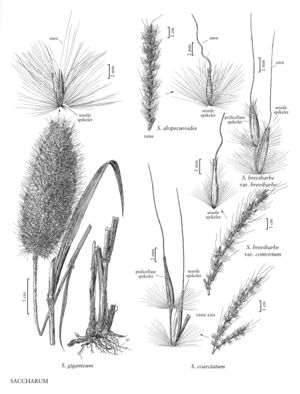Difference between revisions of "Saccharum brevibarbe var. brevibarbe"
Synonyms: Erianthus brevibarbis
Treatment appears in FNA Volume 25. Treatment on page 612.
FNA>Volume Importer |
imported>Volume Importer |
||
| Line 42: | Line 42: | ||
|publication year= | |publication year= | ||
|special status= | |special status= | ||
| − | |source xml=https:// | + | |source xml=https://bibilujan@bitbucket.org/aafc-mbb/fna-data-curation.git/src/bb6b7e3a7de7d3b7888a1ad48c7fd8f5c722d8d6/coarse_grained_fna_xml/V25/V25_1504.xml |
|subfamily=Poaceae subfam. Panicoideae | |subfamily=Poaceae subfam. Panicoideae | ||
|tribe=Poaceae tribe Andropogoneae | |tribe=Poaceae tribe Andropogoneae | ||
Revision as of 22:02, 27 May 2020
Upper lemmas of sessile spikelets entire at maturity; awns 15-22 mm, straight or sinuous throughout.
Distribution
Md., Tenn., Tex., La., N.C., Ala., Okla., Ark., Ill., Miss.
Discussion
Saccharum brevibarbe var. brevibarbe grows in the southeastern coastal states and is common in central and southern Arkansas, eastern Oklahoma, the piney woods region of eastern Texas, and northern Louisiana.
Selected References
None.
Lower Taxa
None.
